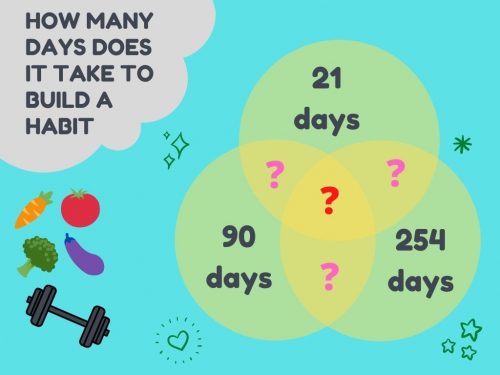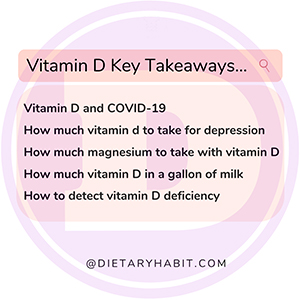How Long Does It Take To Build A Healthy Habit

If you’re here being motivated to start building a healthy habit right away, congratulations then! But wonder how many days does it take to build a healthy habit? Never worry about the time it requires to form a good habit. Just enjoy the action and do it consistently. Eventually, you’ll embrace the freedom and pleasure a healthy habit might give. Do it routinely, set a reward for practice, and you’ll start to feel the automaticity in your action after some time.
If you want to make the new behavior your “second nature,” practice sincerely for 2-3 months (source: British Journal of Medicine). In that period, your brain will habituate the action. To gain wisdom about building a healthy eating habit, you need to dig deeper with us. Let’s roll!
Related Post: How To Build & Improve Sustainable Dietary Habits
Researchers and pundits have long been pondering on the science of the formation of habits. They researched which habits are healthy, how long it takes to build a habit, the importance of healthy habits, what affects the formation of habits, etc.
Unfortunately, we don’t feel the urge to practice for a long time to turn an action into a habit for many reasons. That’s why we look out for shortcuts. But it’s not healthy to practice shortcuts. Instead, you can compress the action into some singular forms. Pick the best time, place, motivation, or situation to cultivate your good habits. This way, it’ll be much easier to grow a healthy habit, whether eating, drinking, or other forms of habits.
How Many Days to Build A Healthy Habit
Observing the research subjects, the scientists shared the results about the time required to build a habit. The time varies from 18 days to as long as 254 days. Some old theories are still popular about habit building. However, you need to know the scientific basis of every research as simple as possible. And you should know what affected the analyses and what the gaps in the studies are.
Many researchers, including the reputed Phillippa Larry, suggest that it’s better to expect around ten weeks of consistent practice for habit formation.
Without any further ado, let’s discuss the widely known 21 days habit theory and estimate its worthiness in the 21st century.
What Is 21 Days Habit Rule
A cosmetic surgeon from New York, Maxwell Maltz, observed a strange pattern in the behavior of his patients. While their limbs or parts of the body were being amputated, they could still feel the ghost limb for 21 days. And right after 21 days, the feeling shies away, and they can adjust to their new life without a haunted leg. Dr. Maltz researched it more on his patients and found the same patterns in them. He then tried to convert some of his actions into habits. Being satisfied, Dr. Maltz claimed that it needs a minimum of 21 days to form a habit.
His book Psycho-Cybernetics sold a million copies, and there was hype across the world. Unfortunately, with time passing, almost everybody deviates from the narratives of Dr. Maltz. They misinterpreted some topics and started spreading myth about it. To be precise, the rule is the 21/90 days rule. To modify an action into a permanent part of your lifestyle, you need to keep practicing for 90 days non-stop. To build a habit, firstly, you should commit the action for 21 days consistently. Then you’ll start to feel automaticity in your activity. The next step will be keeping this action on the run for the next 90 days, and then, only then, it’ll be a part of your daily life.
Does It Take Exact 21 Days To Form A Habit
It’s not that easy and not that difficult to grow a healthy habit. It depends on what types of habits you are mastering. We’ll discuss it later. But it’s mostly the misinterpretations about the 21 days habit theory. Maxwell Maltz didn’t claim it as a fact. It doesn’t need the exact 21 days to build a habit or the exact 21 days to break a habit. He stated the number of days as the minimum.
For the observation, Dr. Maltz chose a specific group of people who had had physical barriers. And he didn’t put it on a simple number 21 days. Most of us skip a solid clarification that Dr. Maltz uses the word ‘minimum.’ He exactly stated that a minimum of 21 days is needed to build a habit. To make the habit permanent, it’ll need another 90 days.
How Long Does It Really Take To Build A Habit
A paper published in 2009 in the European Journal Of Social Psychology was hugely applauded for observing the time required to build a habit. The research was carried out by Phillippa Larry, who was the principal author of the article. The research was conducted on 96 people for 12 weeks. The subjects were tasked with simple activities like eating, drinking, and simple physical movements. They chose the action themselves as it’s the most influential than being imposed upon. However, they needed to perform in the same context, for example, after breakfast.
Phillippa Larry et al. constructed a model that measured the required time in a broader context. The final results predict that it needs almost 18 to 254 days to build a healthy habit depending on the types of habits and individual’s motivation. It requires 66 days on average to build a habit. Another aspect of the research suggests that it needed 84 days for an individual to bring about automaticity in his actions.
However, the time depends on several factors, and it’s not observed in this research. There are multiple research gaps in this study that provide opportunities for future researches.
A habit of drinking milk after dinner is much easier than taking a walk after dinner. The more complex an action, the more effort it needs to convert into a habit. Also, the fewer rewards an action generates, the more difficult it gets to form a habit. Moreover, it becomes a time-consuming and lengthy process.
If you practice drinking a glass of water after breakfast, you may end up making it a habit in just a couple of days. If you start taking a cup of coffee in the morning, it may need more days to convert into a habit. But when you intend to develop a habit of jogging, it will surely take more time than the previous habits. If you try it before breakfast, you may quicken the habit-building process. Because after breakfast, you may have haste for your office, or your body may be sluggish. Building a habit of jogging after dinner may need much effort and time as it’s a time to take a rest.
Factors That Might Affect Habit Formation
To give you clear reasoning of the time required to form a habit, let’s delve into the factors that might affect the process.
Efforts or Struggle
If the action needs less effort, then it’s easier to turn it into a habit. But it would be best if you practiced it consistently until you feel automaticity in your action. Research suggests that you should spend at least 18 days on habit formation. But if you try to build a habit that’s struggling and exhausting, you’ll need more time until you feel the automaticity. It may extend to as long as 254 days. That means you’ll need more patience to be consistent. However, a day off from the action doesn’t affect the habit formation process.
If you practice cleaning hands after eating over a long period, it may need the least time possible to turn into a habit. But if you try to build a habit of daily pushups at dawn, it’ll require a certain amount of effort and struggle.
Motivation or Incentive
Motivation is the best way to cut your habit-building time shorter as much as possible. And a research paper published in the National Library of Medicine suggests that intrinsic motivation or self-determination is a powerful enzyme for habit formation. And it’s so difficult to pursue an out-of-box habit without proper motivation.
Pleasure or Rewards
According to recently published research, researchers claimed that pleasure speeds up the habit-building process. The more you are pleased with the action, the more endorphins are released into your bloodstream. And it helps to remove the monotony when you practice habits daily. Rewards play a vital role in the formation of sustainable healthy habits.
Rewards sometimes act as drugs for habits. People crave rewards through habits. It’s better to be careful before choosing habits. Bad habits will ruin your health. Maybe it’s the pink or green foods that give you pleasure in eating. Some may find white foods delicious. better find which food gives you the aesthetic pleasure in eating. Then it’ll be a lot easier to pursue a healthy eating habit.
Context or Time
The time of practicing habits also plays a significant role in determining the required time to build the habits. It would help if you practiced the action under the same context, same circumstances over a while. It’s better to pick the most convenient time for you. Please don’t pick a time when you’re in a hurry to run for office, school, or other programs.
It’s all about your personalized choice. Whenever you feel comfortable, jump start to build your healthy habit. At noon, it’s not wise to begin pushups under the scorching sun. Right after a heavy meal, you don’t want to do heavy work. So wisely choose the context of your habit and utilize it to build a healthy eating habit.
The Final Words
If you’re packed with all the materials needed for the habit-building process, you can jump-start. Because now is the best time to build a habit which is healthy for your life. You may come by some shortcuts methods online. But favor yourself to check the references and their scientific values. It’s maddening if you don’t attain expected outcomes after hard work investing a lot of time. Once you’re disheartened, you won’t find the energy to keep up building a healthy habit.
If you find the article valuable, share it with your friends who want to know about the time required to build a healthy habit. Also, comment below if you’re successful in building a healthy habit. Be inspired and inspire the people around you.




